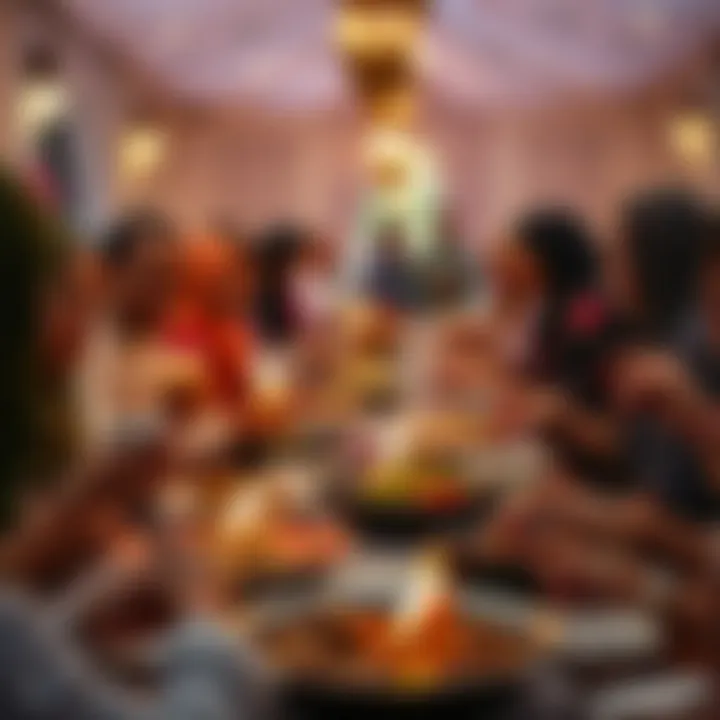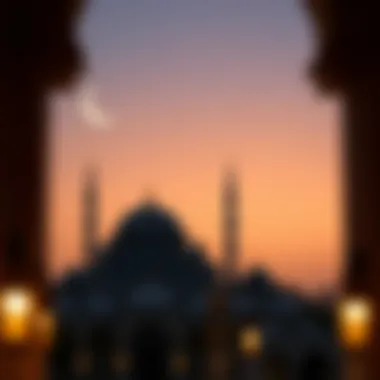Cultural and Economic Impact of Ramadan in the UAE


Intro
Ramadan is like a tapestry woven into the cultural fabric of the United Arab Emirates, richly layered with traditions, spiritual significance, and social dynamics. Every year, this holy month invites both residents and visitors alike to engage in a unique experience that transcends simple fasting and prayer. It’s a time when the sun sets, and the streets come alive with laughter, food, and communal gatherings. This article will dissect the many facets of Ramadan, ranging from the deeply held religious observances to the transformative economic impacts that shape daily life in the UAE.
Market Trends and Insights
As the sun sets during Ramadan, a palpable shift occurs in the UAE's economic landscape. The long-held customs associated with this sacred month have not only shaped social norms but have also led to distinctive trends in various sectors, particularly in real estate.
Current Market Overview
Over the last few years, the real estate market in the UAE has witnessed noticeable fluctuations during Ramadan. Traditionally, leasing and sales activity slows down initially as many expatriates tend to travel back home for the holiday. However, by mid-Ramadan, interest often picks up with community engagements that lead to an increase in gatherings and celebrations. Certain property areas, particularly those that cater to families, start seeing a surge in demand for short-term accommodations, as homes filled with relatives and friends beckon festive reunions.
Future Predictions and Opportunities
Looking ahead, industry analysts predict a rebounding trend for investments in the real estate sector post-Ramadan. With the UAE embracing a more international audience and encouraging tourism, opportunities for investors could multiply. Developers are beginning to focus on creating mixed-use spaces that offer both living and leisure possibilities, preparing for future festivals and gatherings. This shift responds not only to a growing expatriate community but also to the desires of locals seeking versatile living spaces.
"Understanding the socio-economic impacts of Ramadan on the real estate market can give investors a leg up in making informed decisions."
Property Types and Listings
For those considering investing during this festive season, known property types are especially relevant. From residential homes to commercial real estate options, each segment has its own benefits and challenges, particularly during this time of year.
Luxury Apartments
Luxury apartments in high-demand areas tend to attract affluent expatriates looking for seasonal stays. Properties near popular Islamic cultural sites or prime dining experiences see elevated interest. Many rental agencies report that these luxury listings often come with short lease options, catering to those looking for a hassle-free experience during Ramadan. The attractions include breathtaking views of the city and modern amenities that allow for an upscale lifestyle.
Commercial Real Estate Options
The opening of new restaurants and cafes during Ramadan gives rise to opportunities in commercial real estate. Investors often seek spaces that can host large gatherings for Iftar meals, something many companies take part in to foster community spirit. This demand leads to an interesting dynamic in rental prices which may either increase or stabilize based on how each area adapts to the influx of seasonal business.
For continued updates on real estate trends in the UAE, resources such as Dubai Land Department and Property Finder provide valuable insights regarding current market conditions and future predictions.
Understanding Ramadan in the UAE
Ramadan is more than just a month of fasting; it's a tapestry interwoven with the threads of culture, spirituality, and community life in the United Arab Emirates. This holy month serves as a season of reflection, connection, and renewal for Muslims and non-Muslims alike. It provides a unique window into understanding the social fabric that binds the diverse population in the UAE together.
During Ramadan, the atmosphere changes palpably. The sunrise-to-sunset fasts impact daily routines, prompting shifts in working hours and communal gatherings. Even the air seems to resonate with the spirit of giving and togetherness. For expatriates living in the UAE, this month becomes a learning opportunity, allowing for deeper engagement with local customs and traditions. This understanding can bridge cultural gaps and foster a rich exchange of beliefs, thereby strengthening social bonds.
In practical terms, knowing how Ramadan is observed can benefit businesses, investors, and homeowners. For instance, retail sectors often see a spike in demand for certain products, such as food items for Iftar, the evening meal breaking the fast. Recognizing these patterns can lead to favorable economic planning and successful community initiatives.
Furthermore, community events during this period, like mass Iftars and charity drives, present opportunities for expatriates to mingle with locals, fostering unity while broadening perspectives.
The value of understanding Ramadan in the UAE lies not just in recognizing a religious observance but in appreciating how it shapes lives and enhances social cohesion across varied cultural contexts. By delving into its rich historical roots and religious significance, we can better grasp its profound impact on contemporary Emirati society.
Historical Context of Ramadan in the UAE
The roots of Ramadan in the UAE stretch deep into history, shaped by the rich cultural tapestry of the region. Traditionally, this holy month has been observed in the Arabian Peninsula for centuries, deeply connected to Islamic teachings following the Hijrah, the migration of the Prophet Muhammad from Mecca to Medina. The significance of this month stems from the revelation of the Quran, which lays the foundation for the Islamic faith.
In the UAE, the commemoration of Ramadan has evolved. Originally, different tribes marked the month in various ways, often mixing local customs and traditions with Islamic practices. Over the decades, as the UAE modernized, these traditions found new expressions without losing their essence. This adaptability reveals the strength and flexibility of cultural practices, showcasing how traditions can coexist with contemporary life.
Religious Significance of Ramadan
Ramadan holds profound religious importance for Muslims, acting as a spiritual cleanse designed to enhance one's consciousness of God—known in Arabic as Taqwa. Fasting is not merely about abstaining from food and drink; it is an opportunity for heightened reflection and renewal of faith. The discipline involved in fasting also serves as a reminder of the importance of compassion toward those less fortunate, forging a sense of unity and empathy.
The Taraweeh prayers, which are performed at night during Ramadan, further amplify the month's spiritual significance. Many believers gather in mosques to engage in these extended rituals, deepening their sense of community and commitment to their faith.


During this month, many find an increased motivation to perform acts of charity, with numerous programs initiated to support the less fortunate. This collective action not only aids in community building but also reinforces the moral and ethical foundations upon which the UAE was built.
In summary, the understanding of Ramadan in the UAE encapsulates an intricate blend of history and religious practices that shape the lives of individuals and communities alike. The significance extends beyond mere observance; it encourages an appreciation for the values of empathy, connectedness, and respect across all sectors of society.
Cultural Practices During Ramadan
Cultural practices during Ramadan in the UAE play a vital role in fostering community spirit and enhancing individual experiences. As people fast during daylight hours, the month becomes a time for reflection, prayer, and togetherness. These practices not only honor spiritual traditions but also strengthen social bonds, making Ramadan a unique occasion for both locals and expatriates.
Iftar Traditions and Community Gatherings
Importance of Sharing Meals
Sharing meals during Iftar is more than just a ritual; it's a deep-seated tradition that emphasizes community and connection. Each evening, families and friends gather to break their fast together, often over a table filled with a variety of dishes. This act of breaking bread symbolizes unity and generosity, bridging cultural divides among both locals and newcomers in the UAE.
The first sip of water and the date eaten to break the fast remind everyone of the blessings of sustenance. Sharing meals also brings out the diversity in culinary practices, where dishes from different cultures find their way to the dining table. The importance of sharing meals helps foster friendships and build networks, especially among expatriate communities who may feel isolated in a new country.
A unique feature of this practice is the cultural exchange it encourages; families often learn about each other’s traditions through food. The benefit here is significant—everyone feels included and valued, which enhances social cohesion. Moreover, establishing a sense of belonging is crucial for expatriates trying to integrate into a new environment.
Community Iftar Events
Community Iftar events are a hallmark of Ramadan in the UAE, where spaces like parks, mosques, and community centers open their doors for massive gatherings. These events embody the spirit of generosity and hospitality that the UAE is known for. Everyone is welcome, regardless of their background, reinforcing the message of inclusiveness.
These gatherings are not only about food; they are moments of connection that foster dialogue, tolerance, and understanding among various cultures. The two-way learning that occurs at these events is enriching for both locals and expatriates, giving insights into different customs and practices.
A standout aspect of community Iftar events is how they often promote charitable giving. Many gatherings include drives for food donations or funds for local charities, thus weaving philanthropy into the fabric of communal life during Ramadan. This integration of social responsibility adds depth to the festivities, making these events beneficial for the whole community.
Taraweeh Prayers and Their Impact
Taraweeh prayers hold a special significance during Ramadan. Performed each night after the Isha prayer, they provide a unique opportunity for increased devotion and spiritual connection. The gatherings in mosques become vibrant hubs of worship, where people come together dedicated to their faith.
For expatriates, participating in Taraweeh can be both a challenge and an opportunity. While some may be unfamiliar with the rules and customs surrounding these prayers, many find it a chance to learn and engage with their local communities. The shared experience of spiritual devotion can create lasting bonds, moving beyond the walls of religious practice into deeper relationships across cultures.
p class="quote">The essence of Ramadan is not only in fasting, but also in coming together as a community – united through faith, culture, and shared meals.p>
In essence, the cultural practices during Ramadan in the UAE form a tapestry of traditions that are not only rooted in religious significance but also promote community and connection. The sharing of meals and the act of gathering for prayers foster a sense of belonging and enhance cultural exchange, which is indispensable in a multicultural society.
Economic Activities During Ramadan
The month of Ramadan is not only a time of spiritual growth and community bonding in the UAE, but it also brings about a notable shift in economic activity. Businesses gear up for increased patronage, and the overall atmosphere transforms as both residents and expatriates immerse themselves in the festive spirit. This section explores the significant impact Ramadan has on various economic facets, particularly focusing on retail, e-commerce, and real estate.
Impact on Retail and E-Commerce
Shopping Trends During Ramadan
Shopping during Ramadan sees a distinctive character that separates it from typical consumer behavior. Many families plan elaborate meals for Iftar, the evening meal that breaks the fast, driving demand for grocery items and prepared foods. This surge creates an uptick in shoppers flocking to local markets and supermarkets. Notably, around this period, retailers tend to adjust their offerings, focusing more on food and household goods that meet the festive needs of their consumers.
The benefits of this trend stem largely from the heightened interest in gathering options. Families might indulge in purchasing new cookware or special delicacies for Iftar gatherings, making it a lucrative time for both large supermarkets and small local shops. That said, some businesses may face challenges—like inventory shortages or the need for quick turnover of perishable items amidst the bustling pace of Ramadan. Ultimately, shopping trends during this month reflect a community-oriented approach, where local businesses become vital nodes in the fabric of Ramadan traditions.
Promotions and Discounts
Another striking feature of this time is the flurry of promotions and discounts across various sectors. Retailers often devise special offers, buy-one-get-one-free deals, and Ramadan-specific discounts to lure customers. These promotions do more than just offer financial incentives; they symbolize generosity, an essential pillar of this holy month. Frugal shopping becomes a norm, as families plan not just their Iftar menus but as well as their budgets.
Yet, while these promotions are beneficial for consumers, they could backfire if not properly managed. Retailers may have to absorb thinner profit margins in exchange for increased sales volumes, which can cause long-term impacts. Still, the majority view these discounts as an attractive avenue to engage with customers who are intent on spending during the holiday season.
Real Estate Market Dynamics
As Ramadan unfolds, the real estate landscape witnesses its own set of dynamics. The month often brings a heightened interest in housing and accommodations, impacted by both local and expatriate populations. Many families see Ramadan as an opportune moment to move to larger homes, seeking to host guests for Iftar and Taraweeh prayers.


Influence on Property Transactions
The influence of Ramadan on property transactions can be substantial. Historically, the period often sees a spike in housing inquiries, as people contemplate locksmith their living situations. This uptick is typically attributed to families wanting more space for communal gatherings and festivities. Real estate agencies prepare for this seasonal shift, adjusting their marketing efforts to highlight larger properties or family-oriented neighborhoods.
However, this trend also comes with challenges. Market trust must be established swiftly, especially for expatriates who may feel uncertain about navigating the local real estate landscape. For property developers and agents, Ramadan serves as an essential season to engage new buyer demographics, making their efforts pivotal.
Market Trends Before and After Ramadan
Finally, the market trends before and after Ramadan depict an intriguing economic cycle. In the lead-up to the holiday, property viewings and negotiations might pick up, driven by an anticipation of family gatherings and festive activities. The excitement of Ramadan certainly acts as a catalyst for real estate interest.
Conversely, after Ramadan ends, some cooling-off occurs as families focus on settling back into routine. Transactions may level out temporarily. Nonetheless, for those in the real estate arena, understanding this rhythm is crucial; it aids in planning marketing strategies and aligning inventory with potential buyers' expectations.
In sum, the economic pulse during Ramadan is marked by both unique opportunities and challenges, a vibrant blend that highlights the essence of community life during the holy month.
Social Impacts of Ramadan on Expatriates
Ramadan in the UAE is not just a month of fasting; it is a deep-seated cultural phenomenon that significantly impacts expatriates living in the region. This month brings an opportunity for expats to connect with the local customs and traditions, creating a unique blend of cultures. Understanding these social impacts helps expatriates integrate more smoothly while enhancing the rich cultural tapestry of the UAE.
Integration into Local Customs
Expat Participation in Traditions
Expat participation in Ramadan traditions is crucial for fostering community spirit. When expats engage in local customs, like attending the iftar meals or joining in prayers, they not only broaden their understanding of the UAE's culture but also align themselves with the local population's values. This participation showcases a willingness to embrace the customs of their hosts.
The key characteristic here is inclusivity. Expatriates find that many Emiratis welcome them into their homes for iftar, creating bonds that transcend cultural differences. This openness can be eye-opening for many; they realize it’s not just about food but about community solidarity. However, navigating these traditions can sometimes feel overwhelming, especially when faced with the customs that are foreign to them.
The unique feature of embracing these traditions lies in the personal growth it promotes for expatriates. They find themselves adjusting their perspectives and possibly adopting aspects of local culture into their daily lives. Still, the downside could be the pressure to conform to expectations, which can lead to discomfort if they aren't fully comfortable with the practices involved.
Cultural Exchanges
Cultural exchanges during Ramadan offer an exciting opportunity for deepening relationships between expatriates and locals. These exchanges glow brightly during communal events like charity bazaars and cultural fairs that often occur throughout the month. Not only does this create chances for cross-cultural communication, but it also enriches the cultural knowledge of both sides involved.
A significant aspect of these exchanges is their educational potential. Expatriates get to learn about the significance of Ramadan customs and practices directly from Emiratis, fostering understanding and reducing the gap between cultures. Whether it's sharing special dishes or traditional storytelling, these exchanges can be profoundly enriching.
However, while these interactions promote understanding, they may also carry the challenge of miscommunication or misinterpretation of cultural nuances, potentially leading to awkward situations. While generally beneficial, cultural exchanges require participants to tread carefully and respect each other’s backgrounds and traditions.
Challenges Faced by Expatriates
Adjusting to Fasting
Adjusting to the practice of fasting during Ramadan can be a formidable challenge for many expatriates. For those not used to fasting, the shift in daily routines can feel drastic. The change in meal timings and altered work patterns can create a learning curve as expats adapt their schedules to align with local customs.
The key characteristic of adjusting to fasting is resilience. Expatriates often find that they need to be patient with themselves, allowing for gradual adaptation. Maintaining energy levels while managing work commitments can be tricky, yet many discover that they develop a sense of discipline and focus they never had before, taking this challenge as a personal growth opportunity.
One downside, however, is the health risks associated with sudden changes in diet or daily rhythm. Expatriates may struggle with fatigue, irritability, or even digestive issues, especially in the UAE’s hot climate, making it vital to approach fasting thoughtfully.
Understanding Local Norms
Understanding local norms during Ramadan is pivotal for expatriates who want to blend in and avoid missteps. It encompasses everything from respecting fasting hours to learning appropriate greetings during this blessed month. Knowing when and how to engage in social activities is essential in the context of maintaining good relationships with Emirati colleagues and friends.
The key feature is respect. Demonstrating appropriate respect for local customs can significantly enhance an expatriate's experience in the UAE. This awareness showcases adaptability and willingness to learn and align with the local way of life. For many, understanding these norms can lead to deeper connections with their peers, raising their social standing and acceptance in the community.
Yet, understanding the nuances can be difficult. Misunderstandings may arise if expats unwittingly partake in activities that are inappropriate during the fasting hours. Proper resources and guidance are essential to navigate these waters smoothly and maintain harmonious relationships with their Emirati counterparts.
"The power of Ramadan lies not just in fasting, but in the embracing of communal spirit and mutual respect between cultures."


Government Initiatives Related to Ramadan
Government initiatives play a pivotal role during Ramadan in the United Arab Emirates (UAE). These efforts are essential not only for fostering a spirit of community but also for ensuring that the month is observed with the proper reverence and respect it deserves. Such initiatives encompass awareness campaigns, support for various groups, and charity programs that highlight the essence of giving and sharing during this holy month. For the UAE, these activities are a reflection of its commitment to uphold cultural values while also ensuring that no one, especially the vulnerable, feels left out during this significant period.
Public Awareness Campaigns
Public awareness campaigns centered around Ramadan serve as a vital tool for education and engagement. These campaigns are crafted to enhance understanding of the fasting practices, cultural significance, and religious context of the month. They aim to bridge gaps between various communities, including expatriates, and promote mutual respect among different cultures. The government often utilizes multiple media platforms, including social media, traditional advertisements, and community events to disseminate these messages effectively.
Such campaigns are crucial for:
- Educating non-Muslims about the significance of Ramadan
- Encouraging respect for those who fast, fostering a culture of understanding
- Inviting community participation in events like Iftar gatherings
Through these initiatives, the government not only informs but also brings together residents of all backgrounds, enhancing community cohesion and respect.
Community Support Programs
Community support programs play a crucial role in uplifting the spirit of Ramadan. They are established with the aim of ensuring that everyone, especially the less fortunate, can partake in the month’s abundance.
Charity Initiatives
Charity initiatives during Ramadan are a fundamental aspect of the UAE's observance of this holy month. The core of these initiatives lies in the Islamic principle of Zakat, or almsgiving, which emphasizes the importance of supporting those in need. Each year, various organizations, both government-led and non-profit, launch widespread campaigns to collect donations, food supplies, and essential goods.
The key characteristic of these charity initiatives is their inclusivity; they are designed to reach all sections of society. For example, many programs set up food drives that specifically target low-income families and ensure that everyone can partake in Iftar meals, which symbolizes hospitality and compassion.
Some of the advantages of these charity drives are:
- Enhanced Community Engagement: People are encouraged to donate, volunteer, and share, fostering a sense of community.
- Cultural Preservation: They help in cultivating the tradition of giving, which is central to the Ramadan experience.
However, it must be noted that:
- Logistical Challenges: Coordinating large-scale charity initiatives can sometimes face hurdles, like ensuring timely distributions.
Support for Vulnerable Groups
Support for vulnerable groups is another critical facet of the community programs during Ramadan. This aspect addresses the needs of various demographics, including the elderly, disabled, and low-income families. The UAE government allocates funds to support shelters, food banks, and health services specifically during this month to ensure that everyone has access to basic needs.
The key characteristic of this support is its targeted approach, ensuring that those who might otherwise slip through the cracks receive the necessary assistance. For instance, outreach teams visit communities to assess needs and distribute care packages that often include food, hygiene products, and medical supplies.
The unique feature of supporting vulnerable groups is:
- Tailored Assistance: Programs are specifically designed based on the demographic needs, ensuring effective use of resources.
Despite these efforts, some disadvantages can arise, such as:
- Awareness Gaps: Sometimes, those in genuine need may not be aware of available resources or may hesitate to approach help services.
End: The Essence of Ramadan in the UAE
As Ramadan unfolds in the United Arab Emirates, it serves as not just a period of fasting, but also as a vibrant tapestry of cultural identity, community spirit, and economic vitality. Far beyond abstaining from food and drink from dawn till dusk, this holy month embodies values deeply rooted in the UAE's heritage, shaping the very essence of life in the region.
Reflections on Cultural Identity
The observance of Ramadan in the UAE beautifully marries tradition with modernity. This blend is pivotal in reinforcing a sense of belonging among expatriates and locals alike. During this time, the air is rich with the aroma of dishes prepared for Iftar, signaling the end of a day's fast. Streets come alive with colors and lights, creating a unique ambiance that encapsulates community.
The communal prayers, known as Taraweeh, resonate across mosques, drawing people together as they affirm their faith. This not only strengthens personal beliefs but also connects individuals to their cultural roots, fostering an environment of shared understanding and tolerance. The values of generosity and empathy shine through when people engage in acts of charity, thereby weaving a fabric of support for the less fortunate. In a way, Ramadan encourages individuals to reflect on their roles within the larger community, enhancing cultural identity.
Future Outlook for Ramadan Celebrations
Looking forward, one can only expect the significance of Ramadan in the UAE to evolve further, adapting to the aspirations of a diversifying population. As globalization continues to influence cultural exchanges, the essence of this month might see increased inclusivity, with more initiatives aimed at bridging the gap between cultures.
Furthermore, technological advancements will play a crucial role. From virtual Iftar events for distant family gatherings to mobile apps focusing on Ramadan recipes and community engagement, the digital age will reshape how people participate. The UAE government’s ongoing efforts to promote tolerance and cultural diversity during Ramadan will likely enhance the holiday's significance. Such initiatives could lead to unique interfaith dialogues that educate and enrich both locals and expatriates, ensuring that the heartbeat of Ramadan pulsates vibrantly in every corner of society.
In summary, Ramadan is more than a month of fasting; it is an experience that solidifies the UAE's cultural roots while paving the way for future traditions. By understanding its significance, one not only gains insight into the UAE’s identity but also appreciates the beauty of communal harmony and the enduring values that bind its people together.











